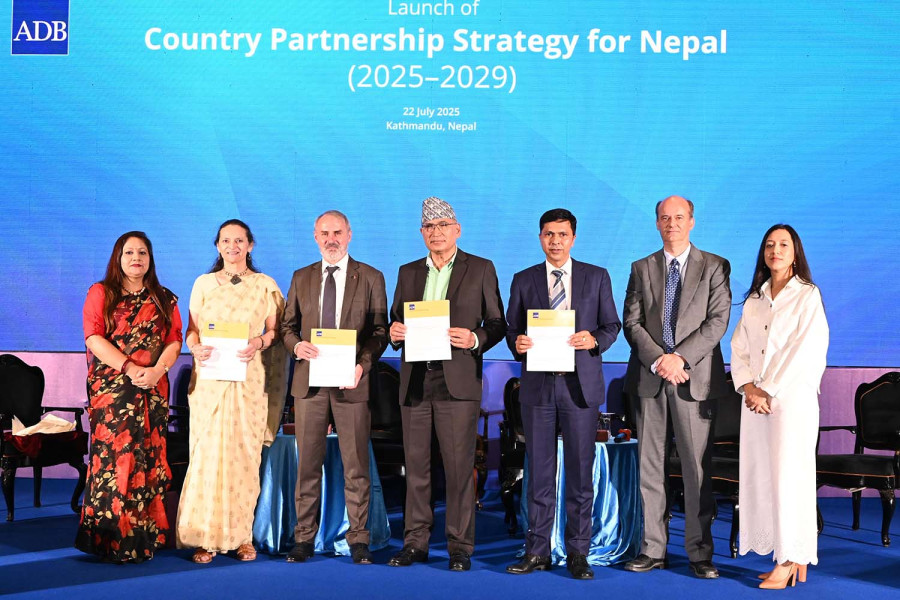Money
ADB unveils $1.91 billion plan to support Nepal’s green, inclusive growth
The withdrawal of key development partner—USAID—has opened funding gaps in critical sectors such as education, health, and infrastructure, which the ADB’s new five-year strategy aims to help fill.
Post Report
The Asian Development Bank (ADB) on Tuesday unveiled its five-year Country Partnership Strategy (CPS) for Nepal for the period 2025 to 2029. The strategy incorporates flexibility to account for the country’s evolving needs and growing global uncertainties.
Notably, the exit of the major development partner—the United States Agency for International Development (USAID)—has created funding gaps in key sectors, including education, health, and infrastructure, which the CPS aims to help address.
The Philippines-based multilateral lending agency stated that Nepal, classified as a developing member country with a low risk of debt distress, remains eligible for concessional ordinary capital resources lending—financing typically provided as low-interest loans, grants, or technical assistance to support national development objectives.
The new CPS outlines three core priorities: promoting private sector–led growth, expanding youth employment, and strengthening environmental sustainability alongside climate and disaster resilience.
ADB has earmarked $1.91 billion (approximately Rs264.59 billion) in concessional sovereign lending through the Asian Development Fund for the period 2025–2028.
Nepal’s policy priorities, the outcome of country performance assessments, and project readiness will guide annual disbursements.
ADB also plans to explore innovative financing mechanisms, including issuing thematic and local currency bonds—such as Nepalese rupee-linked bonds—for international investors.
The strategy aims to drive Nepal’s development through an inclusive, employment-intensive, green economic transformation. It focuses on human capital development and improved public service delivery, while reinforcing environmental sustainability and climate resilience.
The planned country programme includes investments in hydropower generation, grid modernisation to reduce transmission and distribution losses, and clean public transport initiatives such as electric buses and ropeway systems.
It also envisions support for climate-resilient and all-weather roads, year-round irrigation systems, flood risk mitigation, integrated water resources management, ecotourism development, and the construction of disaster-resilient school infrastructure.
ADB also expressed interest in helping Nepal and its private sector tap into global carbon finance markets through projects that reduce greenhouse gas emissions, such as the adoption of electric mobility solutions and e-cookstoves.
The selection of projects in each sector will be based on ADB’s comparative strengths, government priorities, implementation capacity, and collaboration with other development partners. The CPS aligns closely with a joint strategic approach agreed between ADB and the World Bank Group.
The partnership will focus on core sectors such as energy, transport, water and urban services, agriculture, rural development, natural resource management, and education.
Cost-sharing arrangements will continue, with a ceiling of up to 80 percent for loans and grants, and 85 percent for technical assistance. ADB clarified that actual funding shares will be determined on a case-by-case basis, subject to project-specific economic and financial assessments.
Deputy Prime Minister and Finance Minister Bishnu Prasad Paudel formally launched the CPS in Kathmandu. It received approval from ADB’s Board of Directors on 17 June.
For the first time, the CPS was developed jointly with the World Bank Group’s Country Partnership Framework for Nepal, marking a new level of coordinated planning between the two multilateral institutions.
“The launch of ADB’s new Country Partnership Strategy marks a new chapter in our six-decade partnership. Aligned with Nepal’s 16th Plan, it supports inclusive growth, climate resilience, and quality job creation—especially for our youth. We deeply appreciate ADB’s continued support in our journey towards economic transformation,” said Minister Paudel.
Arnaud Cauchois, ADB’s Country Director for Nepal, said the CPS reaffirms the bank’s strong commitment to Nepal’s development priorities and lays a comprehensive roadmap for achieving inclusive, green, resilient, and employment-focused economic growth.
“We appreciate the leadership of the Ministry of Finance and the deep collaboration with the World Bank Group.
ADB remains committed to working with all stakeholders to implement the Country Partnership Strategy effectively through a combination of investment projects, policy-based lending, and sector development programmes that integrate policy reforms, institutional capacity building, and infrastructure development,” Cauchois said.
An earlier version of this report implied that the Millennium Challenge Corporation (MCC) had exited Nepal. We had quoted the ADB's new Country Partnership Strategy verbatim. In fact, as of today, the MCC has given continuity to its Nepal projects.




 9.83°C Kathmandu
9.83°C Kathmandu














